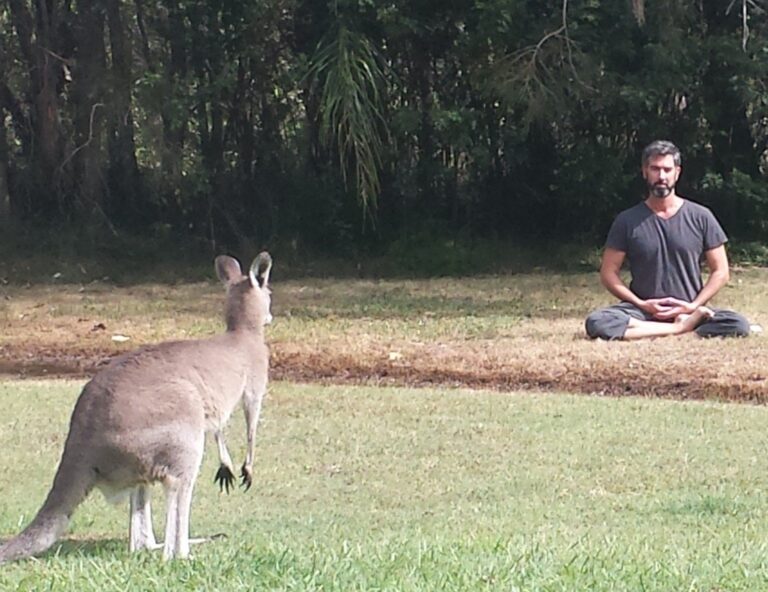Being spiritual can simply mean being kind. The Dalia Lama famously said that his religion is kindness and not that famous, but has a huge influence on me. My father once said that his religion was a good guy. A good guy in Australia is a strong Australian archetype, a guy who is strong but kind, always ready to swear and make fun of the elite, unless he is a top athlete whom Australian guys idols are, and a good guy above all, he has a fierce sense of humor, making fun of himself as much as he teases others mercilessly. It turns out that growing up in Australia and admiring the good guy ideal is actually quite spiritual in nature.
After a mainstream middle class upbringing in Australia I liked the idea of selling all my possessions at the age of 28, there wasn’t much, and moving to a Buddhist center and becoming a monk. Not your usual calling for an Aussie guy, but I was disillusioned with the 9-5 grind and thought it made sense to train my mind to be happy, wise and compassionate. Since then, I have studied Buddhist wisdom in depth and have become somewhat obsessed with meditation as a way of life. It is here that my two paths of being a good Australian guy and a Zen practitioner collide.
A famous Zen saying goes: when I am hungry I eat and when I am tired I sleep, so here Zen becomes the experience of being natural and divinely ordinary and not trying to escape to an enlightened ideal or a perfect self or superhuman. become, but instead it is already illuminated enough to be present during a morning walk. Said Zen Master Suzuki
“If you can’t find relief here right now, where else do you expect to find it?”
Sure, Zen and an Aussie guy share an irreverence for ceremony and tradition, but what I find most similar is the Australian ‘she’ll be right’ attitude. An eternal, easy-going mentality that can laugh at every setback. In fact, in the toughest of times, for example the loss of a job, the break-up of a relationship or even a death, an Aussie guy is prone to saying that the good old Aussie guy will often announce, ‘She’ll be the right size are’.
There is even a Buddhist deity called Samantabhadra, which translates as ‘the all-good’. Far from being cruel or dismissive, this idea is actually a recognition that at the heart of every experience, whether good or bad, is a divine essence, a Buddha nature, and that the role of meditation is to take into account every situation. holding this illumined essence as primary and the flow of the world as a secondary appearance – like ripples on the ocean of eternity.
“All experiences are made of the same stuff, but look different, just as all gold jewelry is made of gold, but takes many shapes and styles.”
There was an Australian tourist advertising campaign a few years ago in which an attractive Australian woman in a bikini on a beach beckoned to the world, “Where the hell are you?” This could actually be a great Australian koan, a profound question that raises a deep realization. Many spiritual types are aware of the spiritual attitude of always being in the now, best known by Eckhart Tolle in his book The Power of Now, but a lesser known stanza is the ‘power from here’. So often we strive to be somewhere else, some elusive place in the future where everything will be better and where you will be happier, but the key to Australian Zen is to be exactly where you are and make the most of it to make. According to Zen, “here” is the place where enlightenment is found, and this is the only place you will ever be. Australian Zen means being present and attentive, wherever you are, no matter how difficult it is. Where the hell are you? I’m always here, buddy.
Therefore, above all, Australian Zen is relaxed and easy-going, cheeky and irreverent, humorous and always light of the situation, believes in a fair approach to all and has an impenetrable optimism. Going with the flow and crushing egos at every turn. Laughing in the face of adversity and exposing your butt to royalty, tough and resilient and ready to share a beer with the next person you meet or pick a fight to defend a woman’s honor. Whatever the situation requires, it will be done. Not trying to escape somewhere else, happily in a sense of mischievous abandon at whatever happens. This is a form of spirituality that I can practice with great pleasure and a spiritual lineage that I could proudly pass on to the next generation.
Written by Chad Foreman
to gradually guide people from the basic principles of mindfulness and relaxation to profound states of consciousness.

